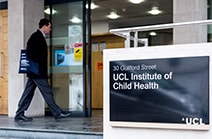Cell and gene therapies are the biggest buzz in the biopharma world at the moment, but while the first products are proving their safety and efficacy, there remains one big question – how to manufacture the products at volume, and at an affordable price.
Two cell therapies, Novartis’ Kymriah and Gilead’s Yescarta, are approved in the US, as is Spark’s gene therapy Luxturna, while GSK’s Strimvelis is approved only in Europe. Another gene therapy, UniQure’s Glybera, was withdrawn from the market after it flopped commercially – in part because of the excessive cost of manufacturing it.
The UK is already a leader in Europe in developing the so-called ‘advanced therapy medicinal products’ but devising a fast, reliable and cost effective manufacturing process is vital if the revolutionary products are to be commercially viable.
London’s top research universities are in the vanguard, with two cell and gene biotech companies, Autolus and Orchard Therapeutics, both spun out of work done by UCL.
The work at UCL has been developed through research led by a number of expert academic researchers, including Professors Martin Pule and Bobby Gaspar ( founders and chief scientific officers for Autolus and Orchard respectively) plus Adrian Thrasher and Waseem Qasim, working in collaboration with Great Ormond Street Hospital (GOSH), UCLA and King’s College London.
Plasticell is based at the nearby biotech hub just outside London in Stevenage, and is working on stem cell technologies and therapies.

It announced yesterday that it is leading a consortium of pioneering gene therapy groups at UCL’s Institute of Child Health (ICH) and Great Ormond Street Hospital (GOSH) to develop new faster and more efficient manufacturing technologies of ex vivo gene therapies.
The initial focus is on rare inherited disorders of the immune system, including Chronic Granulomatous Disease.
“There are a number of highly promising gene therapy targets currently under investigation globally but in order to commercialise these potential cures, the industry urgently needs to find better ways of manufacturing therapeutic products. It is a really exciting project as we test innovative solutions for some of the most advanced medical technologies in collaboration with leading groups in the field” commented Dr. Yen Choo, founder and executive chairman of Plasticell.
.
Another example of a hugely exciting pipeline gene therapy coming out of UCL is in haemophilia A, initially developed by Professor Amit Nathwani at UCL Medical Sciences, and now licensed to BioMarin, which showed spectacular results in late 2017.
Investment is flooding into autologous ex vivo gene therapies – in which faulty cells isolated from a patient’s peripheral blood are corrected by a virus carrying a functional copy of a therapeutic gene – and solving the scaleability and cost challenges area two of the biggest challenges.
Plasticell aims to crack this conundrum using its proprietary combinatorial screening technology, CombiCult. It will use this to develop novel methods for enhancing lentiviral gene delivery to hematopoietic stem cells, and expanding the numbers of corrected cells ex vivo.
The collaboration builds on Plasticell’s work with Professor Adrian Thrasher from UCL ICH, who has led clinical development of gene therapies for Severe Combined Immunodeficiencies (SCIDs), Wiscott-Aldrich Syndrome (WAS) and Chronic Granulomatous Disease.
GMP-compliant manufacturing of the therapeutic products will be overseen by Great Ormond Street Hospital, where these and other gene therapies have been produced and delivered clinically.
The scientific consortium, led by Plasticell, will fund this project partly through a competitive, non-dilutive grant of £740,000, obtained from Innovate UK as part of its ‘Innovation in Health and Life Sciences’ competition.
“We are delighted to extend our collaboration with Plasticell. Gene Therapies are showing real benefit in patients. This is an excellent opportunity to improve the manufacturing technology as we move towards drug licensing” commented Professor Adrian Thrasher, Fellow at the UCL Great Ormond Street Institute of Child Health.
“We have previously used CombiCult to develop cell culture media that expand hematopoietic stem cells and, separately, methods that enhance lentiviral delivery to target cell types. This new collaboration provides us with the opportunity to perform advanced screens using peripheral blood-derived target stem cells and clinical-grade lentivirus to develop an efficient and cost-effective platform for autologous ex vivo gene therapy applications” added Dr Choo.




